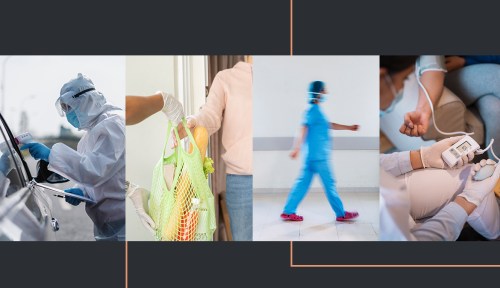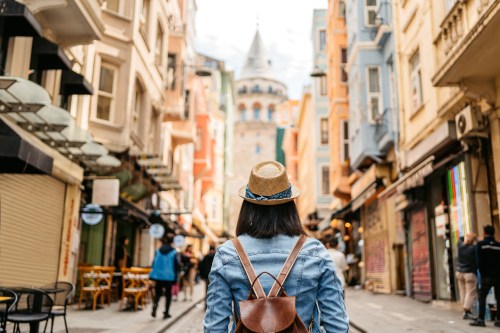On March 11, the week of what is generally considered to be the “anniversary”of when the U.S. went into lockdown from the COVID-19 pandemic, President Joseph Biden signed the $1.9 trillion American Rescue Plan into law. This historic aid package offers $1,400 checks to adults making up to $75,000 a year, expanded tax credits for children, $14 billion for vaccine distribution, $350 billion in aid for state and local governments, and even expanded eligibility for subsidized health care under the existing Affordable Care Act (ACA). It’s a massive and much-needed aid package for millions of Americans who have been struggling to make ends meet during the pandemic. However, there is a sizeable segment of workers in the U.S. that will, once again, not be receiving stimulus checks or much other dedicated aid: undocumented workers.
Experts in This Article
Erica Williams is the vice president for state fiscal policy at the Center on Budget and Policy Priorities. She takes part in leading the organization and its 40-person State Fiscal Policy division and supports the development and progress of the State Priorities Partnership, a network of over 40 state-level fiscal and economic policy shops working to advance racial, gender, and economic justice.
Mo Kantner is the director of state and local initiatives at New American Economy. Her job is using the NAE’s research and statistics to start conversations at the state and local levels with people who want to be more proactive in immigrant integration.
Shelby Gonzales is the director of immigration policy at the Center on Budget and Policy Priorities. She focuses primarily on leading the Center’s work related to access to public benefit programs for immigrants and their families. Gonzales also provides the health team strategic direction related to implementation of effective outreach and program simplification strategies to promote enrollment and retention in Medicaid, the Children’s Health Insurance Program (CHIP), and the Affordable Care Act marketplaces.
Whether one may choose to acknowledge it or not, the estimated 10.5 million undocumented immigrants living in the U.S. make up a vital part of our economy and society—many of whom have been crucial to work in roles deemed essential during the pandemic. An estimated 5.2 million undocumented immigrants are employed in grocery stores, meat processing plants, delivery services, restaurants, transportation, and other essential jobs we depend on, according to bipartisan advocacy group Fwd.us. That group includes almost 280,000 undocumented workers in the health-care industry, according to data from New American Economy, a bipartisan research and advocacy organization fighting for federal, state, and local immigration policies that help grow our economy and create jobs for all Americans.
Despite this reality—and the fact that this group pays more than $10 billion in taxes every year—these crucial workers have continued to be excluded from all COVID-19-related federal relief packages, which is putting their lives and livelihoods in jeopardy. Federal relief that supports undocumented immigrants benefits the country as a whole. So why aren’t they getting it?
How COVID-19 has affected undocumented immigrants in the U.S.
Mo Kantner is the director of state and local initiatives at New American Economy. Her job is to share the research the NAE does with government officials at the state and city levels to better integrate immigrants into local economies. “We see that the undocumented and DACA-eligible [Deferred Access for Childhood Arrivals; a program that provides employment and tax status benefits to certain undocumented immigrants] communities are truly essential in these frontline jobs,” Kantner says. “What we also see is that working these jobs increases their risk of contact and spread of COVID-19.”
While data on this community is scant, one paper published in the New England Journal of Medicine specifically focusing on the Latinx undocumented community in the U.S. states that the COVID-19 mortality rate is “undoubtedly higher” among the undocumented Latinx population compared to the general Latinx population, a subset that is already being hit by COVID-19 harder than white people.
Despite their increased risk of COVID-19 infection, Kanter says that fear of deportation often stops undocumented immigrants from getting tested for COVID-19 or seeking medical help if they do, in fact, have the virus. Shelby Gonzales, the director of immigration policy at the Center on Budget and Policy Priorities, says that at the beginning of the pandemic, she heard that many COVID-19 testing centers required a social security number, something undocumented immigrants do not have. “We’ve seen that with COVID-19 testing and treatment, many are scared they will be targeted as individuals who are undocumented, and that will have negative immigration-related consequences for them,” she says.
“Even though accessing COVID-19 testing, medical treatment, or the new vaccines would not impact their status, anytime they’re accessing any sort of public or government benefits, there’s a lot of underlying fear,” adds Kantner, such as of deportation, costs of hospital visits, or other consequences of being potentially “outed” as undocumented.
“We have had patients come in whose symptoms were so bad that they literally couldn’t breathe. But their big concern is getting out of the hospital so they can get back to work and support their family,” says Jonathan Vargas, a DACA recipient who works as an ER nurse in Greensboro, North Carolina, with his brother, Guillermo. “Because if they don’t work, their family doesn’t eat.”
Medical costs are also a serious concern for many undocumented immigrants (including those with DACA status), as they are excluded from federally funded affordable health-care insurance offered through Medicaid, Children’s Health Insurance Program, and the Affordable Care Act marketplaces, says Gonzales. “This already puts them in a very difficult [financial] situation,” she says. Employer-provided health insurance is also inaccessible to most undocumented immigrants, she adds, because it’s illegal for employers to hire a person they know is undocumented. This forces many undocumented workers into low-wage, “off the books” employment arrangements. “Because of the type of employment these individuals [often] do, they are not offered medical insurance,” she says. (Undocumented immigrants, except DACA recipients and others with “valid work authorization,” are not eligible for unemployment benefits, either.)
All of these factors can keep an undocumented person from seeking medical treatment until it’s dire—which in the case of COVID-19, can be deadly. “For many undocumented immigrants, they live in fear of what a hospital visit would cost them and that fear keeps them away. I’ve seen situations where people do not come into the hospital until they are extremely sick,” says Guillermo Vargas. “By then, it’s too late. It’s just too late.”
Like the Vargas brothers, Javier Quiroz Castro also has DACA status and works as a nurse in the COVID-19 cardiovascular unit at Houston Methodist West in Katy, Texas. He says he’s also seen how fear of deportation prevents undocumented immigrants from seeking medical help. “I have to explain to them that our duty as health-care workers isn’t to report their status. Our job is to take care of anyone, whether they’re undocumented or not. I don’t care if you have a document or insurance. But [some patients] are so fearful to give their name or address.”
Castro says he’s the only Spanish-speaking person in his unit, making him uniquely helpful in explaining to the many Spanish-speaking patients and their families what to expect in terms of treatment. “Some of these people have never been to a hospital before. This is their first experience and there are all these machines, you can’t breathe, you’re scared, you feel this may be the end for you and the language barrier is a real problem. Everyone on the hospital staff tries their best, but I do feel that because I speak [both English and Spanish] I can help bridge a gap that exists,” he says.
How federal relief packages are failing undocumented immigrants
Despite their contributions to fighting the COVID-19 pandemic and doing essential work, undocumented immigrants have been ineligible for virtually all federal relief aid, another consequence of a growing anti-immigration sentiment in the United States over the past decade—particularly during the administration of former President Donald Trump.
These realities have made it hard for undocumented immigrants to receive any kind of federal relief, including with the various COVID-19 stimulus efforts. The Coronavirus Aid, Relief, and Economic Security (CARES) Act, which was passed in March 2020, provided eligible adults with a one-time $1,200 check, four months of additional $600 weekly unemployment benefits, and other tax incentives. The follow-up COVID-19 Relief Deal of December 2020 provided an additional $600 check to eligible adults, as well as other benefits. Because these benefits require a social security number, undocumented immigrants—and even their citizen dependents—did not qualify for this relief, says Gonzalez, even if they pay taxes. She adds that other parts of previous stimulus packages, such as unemployment insurance, exclude undocumented immigrants and their families as well. However, Gonzales says that the December round of relief allowed eligible American citizens married to undocumented immigrants to receive stimulus checks, making it a bit more inclusive.
Unfortunately, the latest round of relief passed this month continues to largely exclude undocumented immigrants, although some concessions have been made for their families. Like the December relief bill, citizens married to undocumented immigrants will be eligible for $1,400 stimulus checks. Per the Huffington Post, the American Rescue Plan also allows citizen children of undocumented immigrants who file taxes with Individual Tax Numbers (ITNs) to receive stimulus benefits. This opens up aid for an estimated 2.2 million people—but still doesn’t directly support undocumented immigrants themselves.
When it comes to individuals with DACA status, like Castro and the Vargas brothers, access to federal economic benefits has been more inclusive. “If the individual is able to file their taxes with a social security number, then they would have access,” Gonzales explains.
Not having access to federal relief makes the economic burden of the pandemic even worse for undocumented immigrants. According to The Urban Institute’s Health Reform Monitoring Survey (conducted in the spring of 2020), Hispanic families with non-citizens have been hit the hardest by COVID-19’s economic fallout, more than other racial and ethnic groups in the country. According to the survey, 69 percent of Hispanic adults in families with non-citizens and about half of those in families where all members are citizens reported losing work or income. According to the Migration Policy Institute, Latinx immigrants had the highest jobless rate of all racial and ethnic groups in the early days of the pandemic, at 22 percent.
Gonzales says it’s a misconception that extending financial relief to undocumented immigrants—at either the federal or state level—would burden the country’s coffers. In fact, she says doing so is critical for our country’s economy. “It would not only help individuals and their families through hardships now, but it also gets us to recover [as a country] quicker,” she says. Not only do undocumented immigrants pay taxes that help boost the economy, but a report by the National Academies of Sciences, Engineering, and Medicine also found little to no effect on the wages and employment of native-born workers in the long-term by undocumented immigrants.
What’s being done to better support undocumented immigrants
While it’s evident undocumented immigrants are contributing to the country, what’s clear is that not enough is being done to support them in return—and that’s bad news for the country as a whole. But Erica Williams, the vice president for state fiscal policy at the Center on Budget and Policy Priorities, says some state legislatures have stepped in to extend relief benefits to those who were left out at the federal level.
“We’ve seen states like California, Oregon, Washingon, and New Mexico create worker relief funds for folks who’ve been left out of federal relief measures, including workers who are undocumented, to make sure they have access to some relief payments during this time when hardship is off the charts,” she says. Additionally, in New York, the Immigrant COVID-19 Burial Assistance Program provides financial assistance of funeral costs to immigrants regardless of status. This is not only meaningful to families at an emotional level but also unburdens them with funeral bills that average over $7,000.
Williams adds that some states, including California and Colorado, have put into place permanent measures to help, including a tax credit based on earnings. “New York, New Jersey, and New Mexico are looking into putting policies like this in place as well,” she says.
Some states have also adopted emergency Medicaid provisions to expand testing and coverage for COVID-19-related health issues, says Williams. But there is still a hesitancy to provide greater health-care benefits to undocumented immigrants. “The national rhetoric that’s been in place the past four years has gotten in the way of making sure everyone has the health care they need in the middle of a pandemic,” Williams says.
With the Trump presidency over, a big question remains: What will change for undocumented immigrants, including those who play a critical role in our workforce and the fight against COVID-19? Gonzales is hopeful: “President Biden has been vocal about public change and reversing the very big barriers undocumented immigrants and their families face in receiving different types of support.” In addition to ensuring undocumented immigrants can access to the COVID-19 vaccine, the Biden administration’s proposed U.S. Citizenship Act aims to legalize millions of immigrants, therefore opening the door to more opportunities for financial COVID-19 relief support. (The bill has yet to be voted on in the House or Senate.)
Gonzales says she believes the new bill would be a remarkable step forward in creating a path to citizenship for immigrants who have made the U.S. their home and want to contribute to it in a meaningful way. She adds that she is also encouraged by non-government agencies who are lobbying for undocumented immigrants. “Many groups care deeply about immigrants and their families and are seeking to improve access to services and supports,” she says. “The Protecting Immigrant Families network has been leading a robust national campaign focused on this and has promoted the adoption of policies that are more supportive of immigrants and their families.”
Castro is also cautiously optimistic about the proposed immigration bill. “I believe [the new immigration bill] is well-deserved to my people, especially now,” he says. “If America is serious about a post-pandemic economic recovery, it will need every hardworking capable person, including undocumented immigrants. This bill would help them help America.” He adds that he also believes it will help undocumented immigrants sick with COVID-19. “They worry about the medical bills they can’t afford if they make it out alive. They wait too long before coming to the hospital for help. This bill won’t erase COVID-19 but it will help ease these types of burdens,” he says.
Jonathan Vargas says he also believes the immigration bill would be beneficial to the immigrant community as a whole, but he’s less optimistic. “Being realistic, I doubt that this bill will pass through Congress, especially in the current political climate we’re living in,” he says. “I do feel that if this immigration proposal was to become law, it would make immigrants in America feel more valued. The majority of immigrants in the U.S. want to contribute to the country in a positive way. We need to stop being treated like second-class citizens and treated like human beings.”
Oh hi! You look like someone who loves free workouts, discounts for cult-fave wellness brands, and exclusive Well+Good content. Sign up for Well+, our online community of wellness insiders, and unlock your rewards instantly.
Sign Up for Our Daily Newsletter
Get all the latest in wellness, trends, food, fitness, beauty, and more delivered right to your inbox.
Got it, you've been added to our email list.











